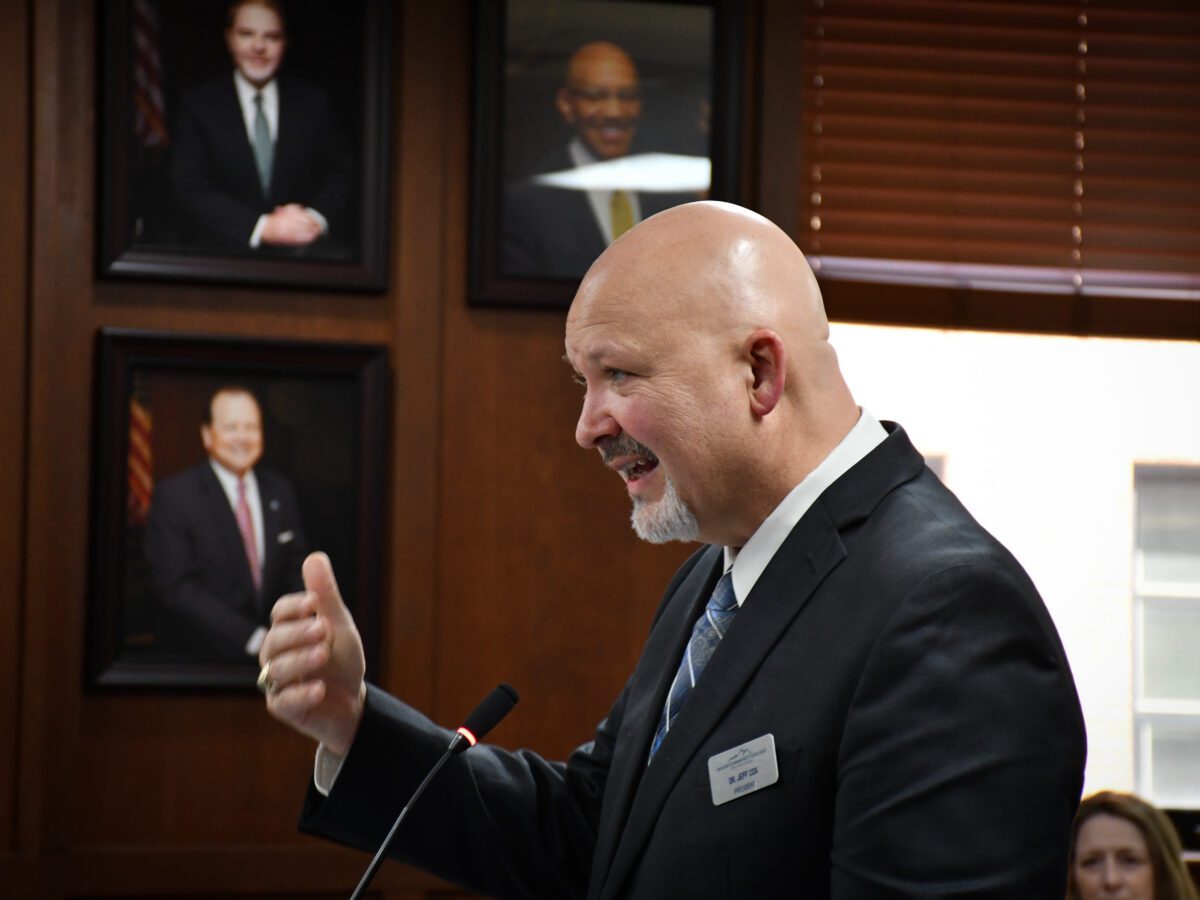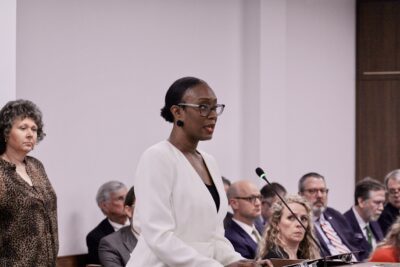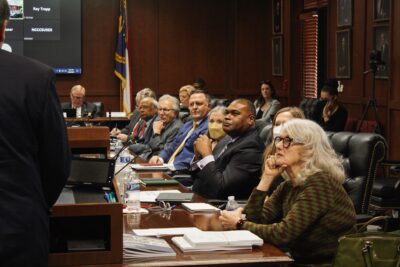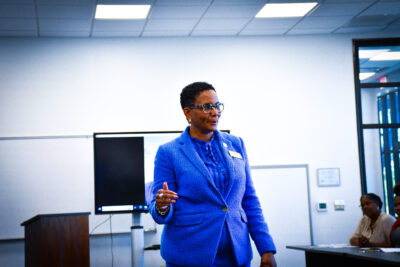
|
|
Jeff Cox, the president of Wilkes Community College and a former superintendent, was officially named the 11th president of the North Carolina Community College system on April 21, 2023.
Cox was chosen out of a semi-finalist pool that included several current or former college presidents, elected representatives, and former system executives from North Carolina who served in prominent roles in other systems across the country. The caliber of the pool was a win for the search process.
Stakeholders surveyed favored the selection of a sitting president of a community college in North Carolina given the need for stable system leadership, the economic impact of community colleges; the critical, all-encompassing role community colleges play in their community; and the slew of bills filed affecting everything from accreditation to funding to governance.
“I am really excited about this tremendous opportunity to lead the North Carolina Community College System,” Cox said in a statement to EdNC. “I have spent my entire adult life in the education arena from pre-K through the university level, working to equip students with the skills, degrees, and credentials they need to improve their social and economic mobility.”
I am eager to get to work with our State Board, our system office, our legislature, and our governor, the Great 58 community colleges and other stakeholder groups to make sure our community colleges are giving every resident in our state access to higher education, whether that be a two or four-year degree or a shorter-term workforce credential of value. Our community colleges are the path to a better life for the majority of North Carolinians, and we are the essential partner for businesses and industries who are looking for a skilled workforce.
Jeff Cox, new NC Community College System president
A survey during the search process indicated at least 67% of presidents wanted a president.
“We are excited to see Jeff Cox take the helm of the North Carolina community college system,” MC Belk Pilon, president and board chair of the John M. Belk Endowment, said in a statement to EdNC. “From the beginning of our work with the great 58, Jeff has impressed our team with his leadership, focus on student success, and drive to improve outcomes for all of the residents of his service area. The search for system president was an expansive one drawing candidates from all over the country — and we thank the State Board and search committee for their service. As we continue pursuit of our goal to have 2 million North Carolinians with a postsecondary credential by 2030, I am excited to see what Jeff and the team at the system office will accomplish alongside all 58 of our community colleges.”
State Board of Community College Chairperson Burr Sullivan shared his sentiments on hiring Cox to lead the system with EdNC:
“The Board is very excited about bringing a proven North Carolina community college leader in to guide the system office. Dr. Cox has spent his entire adult lifetime working in public education. His unique qualities crafted through the experience of leading a K12 system as superintendent and a successful community college has made him the choice in this particular moment. Our state has never had more economic development opportunities coming our way. Having a leader like Jeff Cox driving our efforts around workforce development is an exciting opportunity for this system. We can sense his excitement as he prepares to take the helm. We needed a leader prepared to help lead us forward around regional collaboration, workforce development, growing enrollment, and the other tasks in front of us all. That leader, for certain, is Dr. Jeff Cox.”
Burr Sullivan, chair of the State Board of Community Colleges
Who is Jeff Cox?
Cox currently serves as president of Wilkes Community College. Cox assumed the helm of Wilkes in 2014 after serving as superintendent for Alleghany County Schools for nine years. At present, Cox also serves as the president of the North Carolina Association of Community College Presidents.
During his tenure at Wilkes, the college has weathered COVID-19, the loss of jobs when Lowe’s Hardware moved additional roles from Wilkes County to their new headquarters in Mooresville, and other challenges.
Cox’s focus included an emphasis around social mobility. In his 2021 response to Dr. Gregory Haile’s Dallas Herring Lecture, Cox wrote:
“If we are serious about breaking the intergenerational cycle of poverty and improving the economic and social mobility of those currently on the bottom rung of the economic ladder, what are we willing to do to make that happen? How can we meet all of our students where they are, help them understand the imperative of having a postsecondary degree or credential, help them find the right path for them, and then remove every barrier in their way of completing that postsecondary credential? How can we make a postsecondary degree or credential the new high school diploma for our generation?”
His team and partners in Wilkes County worked diligently to spark partnerships and programs to connect economic mobility of students to economic prosperity of workers and employers to the economic impact of the college on the region they serve.
Cox and his team at Wilkes have also led MerleFest forward — an internationally recognized music festival and fundraiser for the college. MerleFest generates north of a $12 million annual economic impact each year.
Cox shared a story of one of his son’s experience with attending community college in a podcast with EdNC:
I’ve got three teenage sons and they all have gone through the Wilkes Early College High School. The oldest one, Dylan, has graduated from early college high school. Dylan is a classic community college student here with us in a lot of ways. After he finished his degree with us, he didn’t know quite what he wanted to do. He explored some different majors — business and accounting. He figured out that wasn’t quite really his thing.
He considered engineering early on and pursued a four-year degree in engineering. He had thought about that since middle school when he went to an engineering camp at NC State. But he got into some of the higher-level math classes and decided maybe that engineering was not going to be his thing — calculus can do that to people.
But he’s still interested in building things, and taking things apart, and creating things. So ultimately, he landed in our applied engineering program. We have an associate degree in applied engineering. So Dylan is back finishing up his degree in applied engineering with us here at the community college.
I get a front-row seat of student experiences as we’re making changes and doing things at the college. I’ve got my own test group here at home, I get to see how they’re interacting with the changes we’ve written in place.
His wife Reba will be joining him in Raleigh. They have three sons.
How did we get here?
The search for a new president began after then-system president Thomas Stith resigned on July 19, 2022. The following day, the system named former Nash Community College President Bill Carver as the interim system president for the second time. Carver was also the interim president after Peter Hans left the system office to become president of the UNC System.
On Aug. 22, 2022, the State Board of Community Colleges named a bipartisan search committee consisting of 10 Board members and four other individuals.
Here is the committee:
Co-Chairs of Search Committee
State Board Members of Committee
LaTasha Bradford
Shirley Carraway
Wade Irwin
Hari Nath
Ray Russell
Julie Ryan
Sam Searcy
Burr Sullivan
Ann Whitford
Voting Non-SBCC Members of Committee
William Carver
Grant Godwin
David Heatherly
Grayson Whitt
For more details on the committee’s background, click below.
The board also voted to hire a firm experienced in higher education leadership searches. Buffkin/Baker was ultimately the firm selected to manage the process.
In October, the search committee discussed a profile for the ideal system president candidate. They also previewed questions they would later pose in a survey of key stakeholders across the state.
The survey results were released in November. As we reported then:
Out of the more than 1,300 people who responded to the presidential survey, 40% said previously serving as a community college president best qualified a candidate to be system president. Community college presidents were the most likely to answer the question that way, at 67%, and foundation members were the least likely, at 17%.
Nineteen percent of student respondents said a community college president was the most qualifying position for a candidate. Another 42% of students said leading a community college system or university system was the most qualifying position. Among Board members, 45% also selected that prior job experience. The lowest-selected qualifying experience was previously serving as the president of a university at 2%.
In December, the committee finalized a job posting for system president. The job officially posted in January.
Here are some of the highlights from the job post:
“The President serves as the Chief Administrative Officer of the NC Community College System with responsibility for ensuring the success of the System’s mission.”
“The new President should become personally invested in the future of education in North Carolina. In doing so, the President will be expected to continue to raise the profile of the NC community colleges and promote the mission and value proposition of the System.”
“The NC State Board of Community Colleges is seeking an individual who possesses, or can quickly gain, a thorough understanding of the NCCCS, its mission, and its philosophy. The candidate of choice will be a creative, visionary, experienced leader of high energy, exemplary personal integrity, and professional ethics, and should possess the ability to work with and respect a constituency of diverse needs and interests.”
The job posting also noted the selected candidate needed to have a proven ability to build strong relationships with legislators at the General Assembly, maintain and grow strong partnership relationships with key organizations across the state, and ultimately articulate a vision for the future of the system.
The search committee began vetting candidates at their March 1 meeting. Buffkin/Baker brought at least a dozen candidates before the committee according to our reporting. Ultimately, the committee chose to interview 10 candidates in early March.
The next phase came on April 11 and 12, 2023 when the search committee and the remaining state board members interviewed three finalists. The finalist pool was made up entirely of individuals serving in community college leadership roles at present.
What is ahead for Cox and the system?
The 2022-26 strategic plan outlines five goals for the system:
- Goal 1: Recruit and retain top talent to enable the North Carolina Community College System to educate and prepare the State’s workforce.
- Goal 2: Increase access and enrollment at North Carolina community colleges to meet the state’s educational attainment goal and expand post-secondary opportunities.
- Goal 3: Provide resources inside and outside the classroom for all students to successfully enroll, persist, and complete a career program of study.
- Goal 4: Provide education, training, and credentials to develop the most competitive workforce in the nation.
- Goal 5: Increase state funding, streamline the allocation formula, and implement practices to improve system effectiveness.
Cox and the team at the system office will now be working to make the strategic plan a reality — while also tackling the remainder of the legislative session.
In a statement to EdNC, Cox focused on the role of our community college system in developing the workforce the state needs:
“You’ve seen the headlines. Our state is #1 in the country for business. If we want to keep that title, we have to become the # 1 state in the county for skilled workforce. Our Great 58 local community colleges are ready to do whatever it takes to make this a reality, and I am eager to work with folks at the state level to figure out how we can support this critical work in every community across our great state.”
Jeff Cox, new NC Community College System president
Editor’s note: The John M. Belk Endowment is a funder of EdNC’s work.








